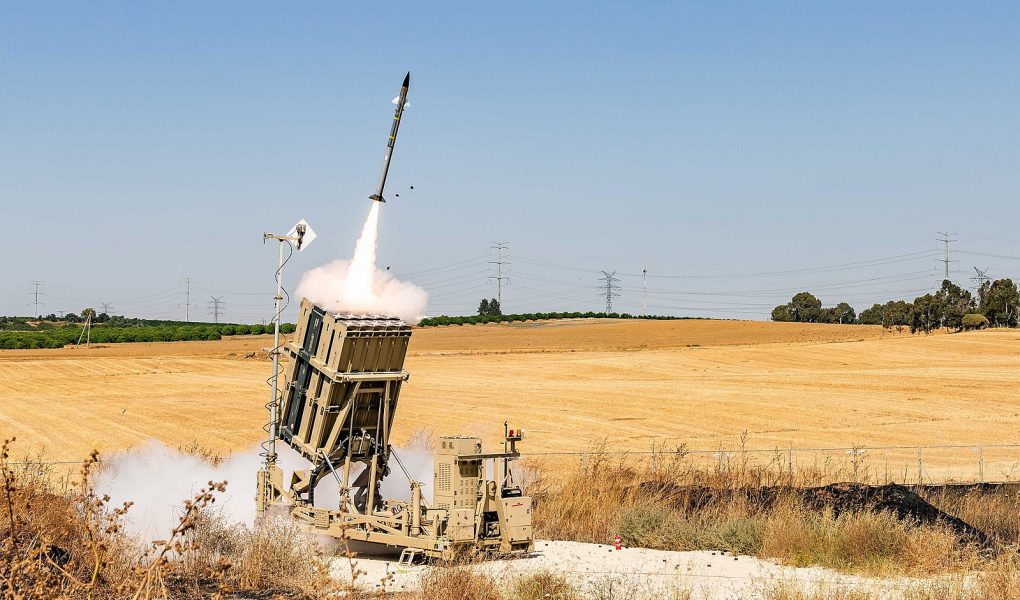Amit Agronov / IDF Spokesperson’s Unit
Five months ago, President Biden committed to helping to replace Iron Dome interceptors Israel expended to protect civilians from rockets the Iran-backed terrorist group Hamas fired from Gaza during last May’s conflict. Congress has yet to fulfill that pledge, with funding currently stuck in the Senate. This is a disturbing deviation in congressional support for Israel and portends greater future challenges.
In 2014, when Israel faced a shortage of Iron Dome interceptors following a previous conflict with Hamas, President Obama promised assistance. Congress quickly appropriated $225 million for Iron Dome with a 395-8 vote in the House of Representatives and unanimous support in the Senate. Then-Vice President Biden proclaimed America’s “obligation to match the steel and the spine of the people of Israel with an ironclad, nonnegotiable commitment to Israel’s physical security.”
That commitment seems no longer “ironclad.” Last month, a group of progressives in the House of Representatives stripped $1 billion to replenish the defensive system from the continuing budget resolution to keep the federal government open. When the House quickly passed a stand-alone Iron Dome funding bill, 420-9, many thought it proved opponents isolated and the problem easily solvable.
However, requiring a separate vote sets a dangerous precedent that delays this bill and risks derailing future Israel-related legislation. A stand-alone bill requires additional floor time, which is always in short supply and opens the door to amendments on unrelated policy issues by senators from both sides of the aisle, further delaying its approval. Indeed, Sen. Rand Paul (R-Ky.) blocked quick passage of the Iron Dome legislation in the Senate and both he and Sen. Bernie Sanders (I-Vt.) are also trying to attach unrelated matters to the bill.
Responsibility for this delay also lies with Senate Majority Leader Chuck Schumer (D-N.Y.).
It is Schumer’s responsibility to navigate the legislative process to reach a successful outcome. To overcome Paul’s objections, Schumer — an Iron Dome supporter — could have held an immediate vote on this life-saving assistance. Instead, Schumer allowed the Senate to adjourn for 10 days.
After the recess, Democrats proposed including Iron Dome funding in their 2022 defense appropriations bill, which may not pass quickly (or at all) and thus keep Iron Dome unfunded. This delay is unnecessary and dangerous.
Iron Dome, a short-range air defense system that the United States co-developed with Israel, is critical to protecting Israeli and Palestinian civilians. During 11 days of fighting in May, Hamas and Palestinian Islamic Jihad fired from Gaza 4,428 rockets at Israeli towns and cities, including Jerusalem and Tel-Aviv, approximately as many as they launched during the 50-day conflict in 2014. Iron Dome intercepted 1,577 of these rockets, but there were still 12 deaths in Israel.
Replenishing Israel’s supply of Tamir interceptors is critical to protecting civilians in future conflicts with Hamas or Hezbollah in Lebanon. More than 10,000 projectiles likely remain in Gaza. Hezbollah’s 130,000 rockets and missiles are more powerful, precise, and long-range than those in Gaza and can be fired in much greater numbers. Large reserves of Iron Dome interceptors are needed to defend innocent Israelis against these threats. Their diminishment in the recent fighting and the lack of timely replenishment could be interpreted by Hamas, Hezbollah or even an emboldened Iran as an opportune vulnerability to exploit.
Iron Dome saves not only Israeli but also Palestinian lives. With Iron Dome intercepting roughly 90 percent of incoming projectiles, Israel eschewed a ground campaign and had the patience and flexibility to pair airstrikes with unprecedented precautions that minimized civilian casualties. Without it, Israel would have to stop rocket fire with widescale air and ground operations that would have risked more Israeli and Palestinian lives.
Congress taking so long to approve funding for Iron Dome, which so obviously protects civilian lives, raises concerns that the United States will delay or even approve assistance of non-defensive weapons that Washington already has committed to. Under the 10-year, $3.8 billion per year memorandum of understanding that Obama signed in 2016, Israel is expected to get more F-35 fighters, precision-guided munitions and aerial refueling tankers, which Israel needs for its defense, especially as Iran is getting ever closer to developing nuclear weapons capabilities. It would be disastrous if Congress delayed or derailed funding such essential weapons systems in the coming months and years. Schumer should own his position of leadership and bring the bill for a vote.
Five months ago, President Biden committed to helping to replace Iron Dome interceptors Israel expended to protect civilians from rockets the Iran-backed terrorist group Hamas fired from Gaza during last May’s conflict. Congress has yet to fulfill that pledge, with funding currently stuck in the Senate. This is a disturbing deviation in congressional support for Israel and portends greater future challenges.
Michael Makovsky, a former Pentagon official, is president and CEO of the Jewish Institute for National Security of America (JINSA).
Originally published in The Hill

